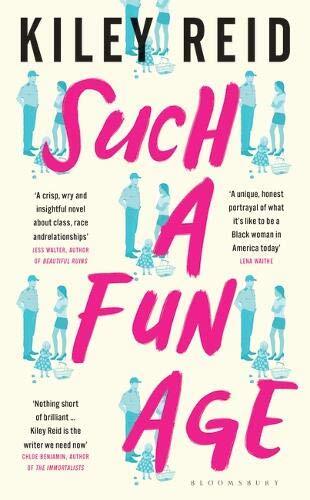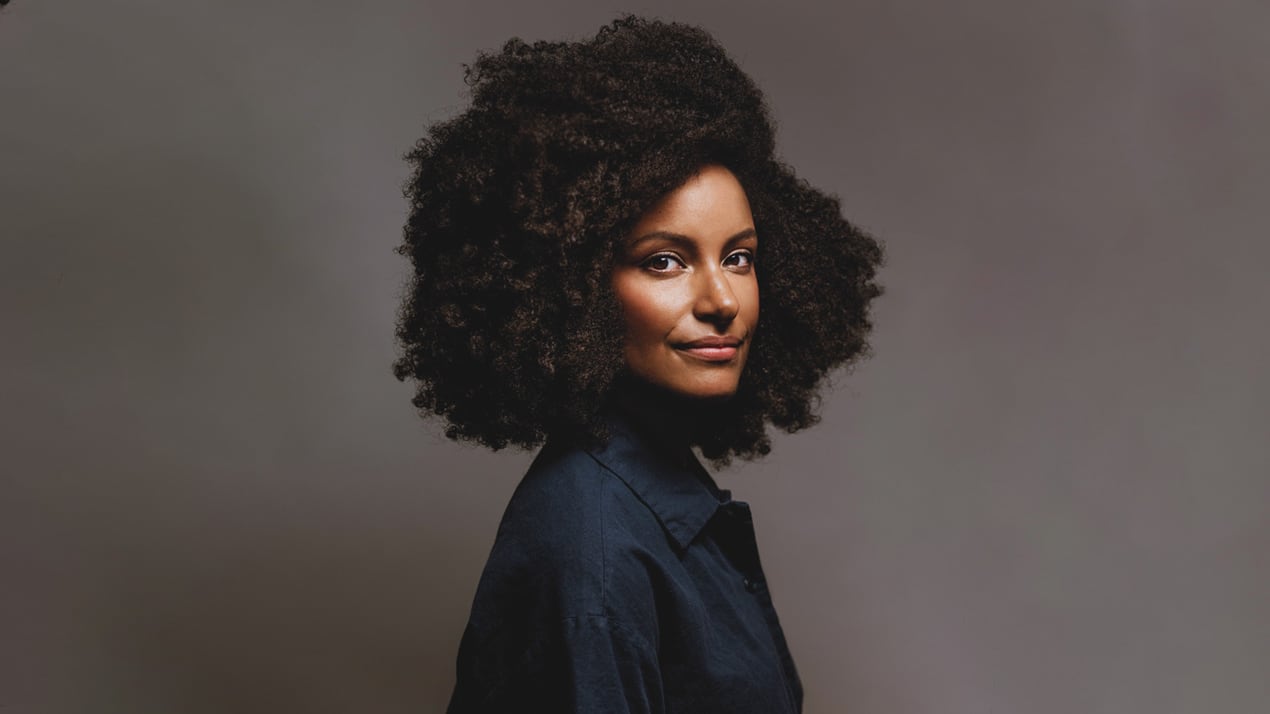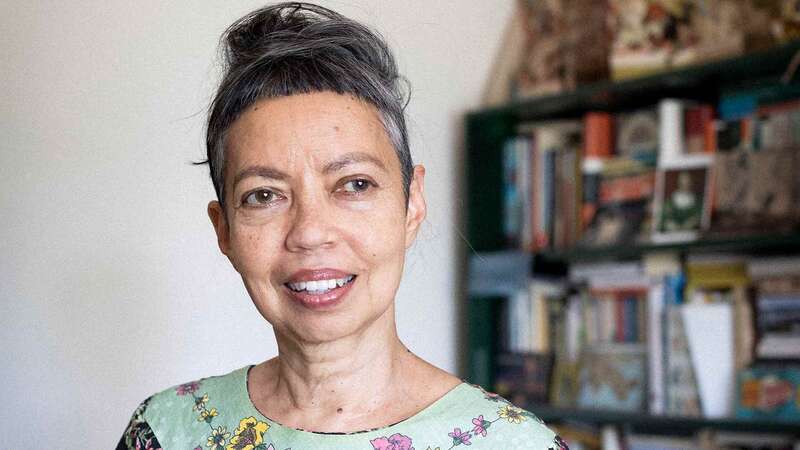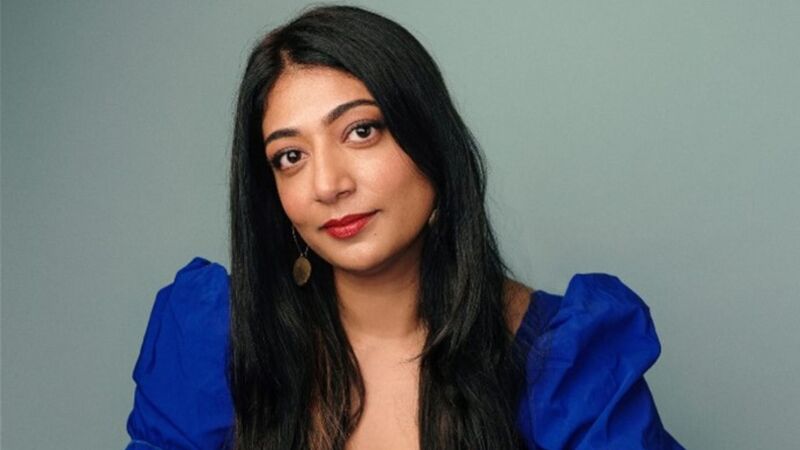You are viewing your 1 free article this month. Login to read more articles.
Kiley Reid | 'Those things aren’t her fault, but the fallacy of the American Dream makes her think that it is'
What is it like to be paid to be part of someone’s family? Kiley Reid’s début Such a Fun Age explores the uneasy nature of "transactional relationships".
"A comedy of good intentions" is how Kiley Reid describes her first novel, Such a Fun Age, when we meet at her UK publisher’s offices in central London. Bright-eyed and composed, she shows not a hint of jet lag, despite having flown to the UK from her home in Philadelphia the previous day.
Such a Fun Age may be a comedy but it begins with a nightmarish situation that takes place at a posh grocery store in Philadelphia at 11 o’clock at night. Emira Tucker, a 25-year-old college graduate who is working part-time as a babysitter, has come to the aid of her employer, Alix Chamberlain, who has asked her to take nearly three-year-old Briar out as there is an emergency at home. While Emira entertains Briar, who loves nothing better than to inspect the displays of nuts, she is confronted by a security guard who accuses her of kidnapping Briar. Because Emira is a black woman, and her young charge is white.
 The rest of the novel follows the fall-out from this night, and the story unfolds from both Emira’s point of view and that of her employer, 33-year-old Alix. Alix started as a blogger but has turned herself into a brand and is in demand as a speaker on women’s empowerment. She is very upset about what has happened to Emira and, feeling guilty, wants to make it right—but gets it painfully wrong. She attempts to befriend Emira and tries to "improve" her life in various cringe-inducing ways. The novel explores the uneasy nature of a transactional relationship, and what it means when someone is paid to be "part of the family". Reid doesn’t see Alix’s actions as evidence of a "bad personality trait", she tells me. Rather, she sees them as a result "of people wanting to deal with racism, but not give up any power. I think true equality comes when someone with power loses it, and someone who doesn’t have [power] gains it. So Alix wants Emira to have all the power, without giving up anything herself." She adds: "On paper, Alix is doing everything right—she has black friends, she reads Toni Morrison—but when it comes to truly helping Emira, there are [just the] trappings of helping. I mean, giving her a bottle of wine is nice, but is that really changing her lifestyle? No."
The rest of the novel follows the fall-out from this night, and the story unfolds from both Emira’s point of view and that of her employer, 33-year-old Alix. Alix started as a blogger but has turned herself into a brand and is in demand as a speaker on women’s empowerment. She is very upset about what has happened to Emira and, feeling guilty, wants to make it right—but gets it painfully wrong. She attempts to befriend Emira and tries to "improve" her life in various cringe-inducing ways. The novel explores the uneasy nature of a transactional relationship, and what it means when someone is paid to be "part of the family". Reid doesn’t see Alix’s actions as evidence of a "bad personality trait", she tells me. Rather, she sees them as a result "of people wanting to deal with racism, but not give up any power. I think true equality comes when someone with power loses it, and someone who doesn’t have [power] gains it. So Alix wants Emira to have all the power, without giving up anything herself." She adds: "On paper, Alix is doing everything right—she has black friends, she reads Toni Morrison—but when it comes to truly helping Emira, there are [just the] trappings of helping. I mean, giving her a bottle of wine is nice, but is that really changing her lifestyle? No."
Someone else who thinks they know what is best for Emira is Kelley, a white man who happens to be in the grocery store and takes it upon himself to film the incident. He catches Emira as she leaves the store and encourages her to publish it online. Emira is furious and humiliated but no way does she want the video going viral.
Tensions and jealousies
Emira loves Briar, who is easily the best rendered two-year-old in any novel I can remember, but she is embarrassed to still be a babysitter while her friends are setting forth on their careers. Riley is a sharp observer of the tensions and jealousies between friends in their twenties when some people start to feel left behind. "Emira takes all that on herself, and says, ‘This is my fault’, rather than, ‘Oh well, Shaunie’s dad helped her get the internship’. I didn’t realise until my thirties how much the amount of money you are making in your twenties directly affects the rest of your life, especially for black women who earn significantly less. I wanted Emira to be this perfect ‘B’ student who doesn’t know what she wants to do."
Driving Emira’s anxiety is the knowledge that, when she turns 26, she will have to come off her parents’ health insurance and, as a babysitter, she doesn’t have her own paid for by her employers. British readers fortunate enough to be able to rely on the NHS may not realise what a big deal health insurance is in the US. "It is if you are a low-income person. I definitely experienced that," says Reid. Between 2007 and 2014 she worked as a nanny and babysitter for over 50 families in New York, and also at an art studio venue which hosted children’s birthday parties, and offers a stark anecdote about the realities of life without health insurance: "I had these moments where I was cutting the cake very, very quickly for the kids—I was really good at it—but I had to stop myself and say, do not go too quickly because if you cut yourself [and need stitches] this could alter the entire course of your life."
In the novel she says she wanted to explore the precarious place occupied by those who are in between financially, not destitute, nor seriously rich: "Emira is not homeless and poor, and Alix is not making a million dollars a year, but their class dynamics are so sharp." The idea that the US is a classless society, at least compared to Britain, is laughable to Reid, who dismisses the American Dream—the concept that anyone from any background can rise due to sheer hard work—as "a complete farce". She points out that Emira believes "it’s her fault that she’s not where her friends are at. Or that if something happens to her in a grocery store, it’s because she doesn’t have a proper job. She doesn’t blame the fact that it’s weird she doesn’t have health insurance and she works so many hours a week... Those things aren’t her fault, but the fallacy of the American Dream makes her think that it is."
The novel deals with serious, sensitive issues—race, class and privilege—but with a light touch. Reid says her interest in dialogue, a strength of the novel, helped her keep it light, the way that "most people discuss race and class, which is making a little joke, and trying to make everything OK at the end. But I also love humour, and page-turning novels that I don’t want to finish, and children are really funny and intelligent, so I wanted to insert all of those little things."
Flawed characters
All the characters in the novel are believably flawed: no one is completely awful, but no one makes all the right decisions either. Reid says: "I wanted characters that were really true to life experience. I feel like humans don’t just have one good quality." She explains: "When I was little, I had girlfriends whose parents loved me, who would invite me over [and] thought I was great. But also they would never want their daughters dating black men. I think that’s an important thing about my characters, because both of those sides can exist very harmoniously in the same person. I wanted [to show] both of those sides where people can love someone so much, from a difference race, but also have these racial biases."
Reid’s talent for dialogue came to light while she was training as an actress at a college in Manhattan: she would write her own monologues to perform and pretend she had found them in a play. She had an early taste of success, booking a commercial, but ultimately decided that the acting lifestyle wasn’t for her. She will have the chance to return to these writing roots soon, though, as the TV and film rights have been acquired by the production company of an Emmy-award-winning actress, and Reid is looking forward to starting work on the screenplay.
Book extract
That night, when Mrs Chamberlain called, Emira could only piece together the words "...take Briar somewhere..." and "...pay you double."
In a crowded apartment and across from someone screaming "That’s my song!," Emira stood next to her girlfriends Zara, Josefa, and Shaunie. It was a Saturday night in September, and there was a little over an hour left of Shaunie’s twenty-sixth birthday. Emira turned the volume up on her phone and asked Mrs Chamberlain to say it again. "Is there any way you can take Briar to the grocery store for a bit?" Mrs Chamberlain said. "I’m so sorry to call. I know it’s late."
It was almost astonishing that Emira’s daily babysitting job (a place of pricey onesies, colourful stacking toys, baby wipes, and sectioned dinner plates) could interrupt her current night-time state (loud music, bodycon dresses, lip liner, and red Solo cups). But here was Mrs Chamberlain, at 10:51p.m., waiting for Emira to say yes. Under the veil of two strong mixed drinks, the intersection of these spaces almost seemed funny, but what wasn’t funny was Emira’s current bank balance: a total of seventy-nine dollars and sixteen cents. After a night of twenty-dollar entrées, birthday shots, and collective gifts for the birthday girl, Emira Tucker could really use the cash.










